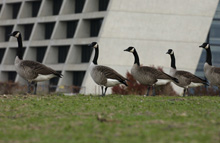 | Monday, April 3, 2006 |
|
Monday, April 3
Tuesday, April 4 |
|
|
Secon Level 3 |
|
Monday, April 3 -Minestroni -Chicken & Mushroom Cheese Steak -Baked Chicken Enchiladas -Pot Roast -BLT Ranch Wrap - Assorted Slice Pizza -Kung Pao Chicken The Wilson Hall Cafe accepts Visa, Master Card, Discover and American Express. |
|
Wednesday, April 5
Thursday, April 6
Chez Leon Menu |
| Fermilab Today is online at: http://www.fnal.gov/today/ Send comments and suggestions to today@fnal.gov Fermilab Today archive Hurricane Relief Page Fermilab Today PDF Version Fermilab Result of the Week archive Fermilab Safety Tip of the Week archive Linear Collider News archive Fermilab Today classifieds Subscribe/Unsubscribe to |
|
Energy Secretary to Visit Fermilab Friday, April 7
|
|
|
|
|
Secretary of Energy Samuel Wright Bodman will visit Fermilab on Friday morning, April 7.
After a brief tour of the lab, he will hold an All-Hands meeting in Ramsey Auditorium at 11:00 a.m. All Fermilab employees are encouraged to attend.
|
| NERP provides an outdoor laboratory for many levels |
| High-energy particle physics isn't the only research happening here at the lab. Fermilab is one of only seven National Environmental Research Parks (NERP) in the country, and at any given time, the NERP program may have as many as half a dozen environmental research projects underway. Projects from Argonne National Laboratory researchers using Fermilab as an "outdoor lab," in particular, have spanned more than a decade. They have been studying soil microorganisms to look at how that community changes when land use switches from agriculture to prairie. Argonne researchers have also been studying carbon flux and flux of atmospheric gases to understand the ability of different ecosystems to sequester carbon, and hence, the impact of different ecosystems on global warming.
Individuals needn't be from large labs or academic institutions to request use of a NERP. Projects have been conducted by researchers at all levels--from Argonne scientists, to university graduate students completing thesis research, to members of a local birding club doing bird surveys.
Anyone who is interested in using the "outdoor lab" for an environmental research project can contact Rod Walton of FESS (x2565, rwalton@fnal.gov), the NERP coordinator, to begin the proposal process. The proposed research will be reviewed to ensure it meets safety standards, among other requirements. If a project is approved, the researcher and lab complete a Memorandum of Understanding (MOU) that outlines the rules and obligations of both parties. MOUs are usually good for three years and are renewable. Project parameters also can be amended. "In over 15 years, we've concluded MOUs for 74 projects," says Walton. "The nice thing is we get good information about our site that we wouldn't learn otherwise."
|
|
The Register, March 31, 2006: The mystery of the vanishing neutrinos Physicists have confirmed enigmatic sub-atomic neutrino particles do indeed have mass. Seemingly paradoxially, the MINOS experiment at the huge underground Fermilab accelerator in Illinois corroborated the fact by showing that they disappear. The multinational team sent a high-intensity beam of neutrinos from Fermilab through 450 miles of solid rock to the Soudan detector in a former Minnesota iron mine. Neutrinos are so small and weakly interacting they can pass through the entire planet uninterfered with. The scientists say that if their neutrinos had no mass, long thought to be a strong possibility, they would have detected around 180 interactions. Instead, just 92 were observed. UK-based Keith Mason, CEO of PPARC, said: "The MINOS experiment is a hugely important step in our quest to understand neutrinos."
The MINOS finding is consistent with neutrino oscillation explanation of the particle's odd properties.
|
| Insulating gloves | |
Insulating gloves have a shelf-life of 12 months from their last test. Once put in service, they must be re-tested after six months of use by an offsite testing facility. Fermilab workers who require insulating gloves will alternate wearing two pairs of different colors: a Black pair between April 1 and September 30 and a Blue pair between October 1 and March 31. The used pair will be tested in the interim. If you think or know that you need insulating gloves for your work, contact your Division/Section ES&H organization. They will assist with sizing, selection, procurement and the testing process. You will initially receive a starter kit containing of a pair insulating gloves, leather protectors and a canvas storage bag. Bob Ducar reminds everyone that "It's relatively easy to protect yourself from shock with insulating gloves, but they only work if you wear them!" |
Tartan Day Celebration
SIST Program
- Reply to Elliot McCrory by email (mccrory@fnal.gov) and he will record
your request
2006 Summer Student Exchange Program
Professional Development
|


